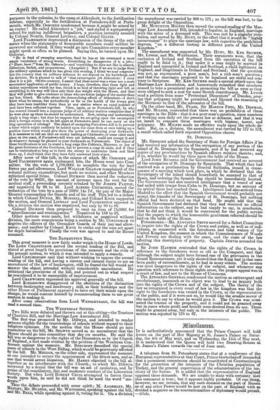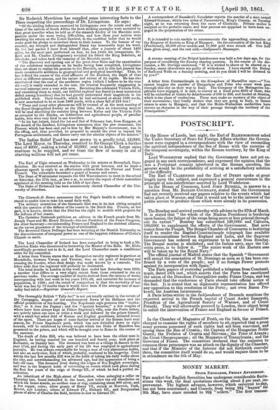3iNP111111f11115.
IT is authoritatively announced that the Prince Consort will hold levees on the part of Her Majestyat St. James's Palace on Satur- day, the 4th of May next, and on Wednesday, the 15th of May next. It is understood that the Queen will hold two Drawing-Rooms at St. James's Palace towards the end of June next.
A telegram from St. Petersburg states that at a conference of the European representatives at that Court, Prince Gortschakoff demanded that a permanent commission should be constituted at Constantinople for the protection of the interests of the Christian population of Turkey, and the general supervision of the administration of the ter- ritory of the Sultan. It is added that the representative of England opposed these demands. We are unable to state with certainty that this statement is true; but it appears highly probable. Of one thing, however, we are certain, that any such demand on the part of Russia or of any other Power would be met on the part of England with as decided a negative as the conventionalities of diplomacy would permit. —Globe.
Sir Roderick Murchison has supplied some interesting facts to the limes respecting the proceedings of Dr. Livingstone. He says :
Of the abiding influence exercised by Livingstone over the minds and affec- tions of the natives of South Africa the most striking examples were narrated by that great traveller when he told us of the staunch fidelity of his Macololo com- panions under the most trying difficulties, and how these poor natives were awaiting his return on the Lower Zambesi, in the confident belief that he would make good his pledge to reconduct them to their homes. To the honour of our country, my intrepid and distinguished friend has honourably kept his word. By the last packet I learn from himself that, after a journey of about 1400 miles, for the most part performed on foot, he has (with his companions, Dr. Kirk and Mr. Charles Livingstone) revisited his friend the King Sekelatn, at Sheskeke, and taken back the remnant of his Macololo escort.
" The discovery and opening out of the great river Shire and the examination of the salubrious mountains on its banks having been completed, Livingstone then set about to realize his promise to the Macololo, and in this last journey has made considerable additions to geographical and geological knowledge. Thus, he has defined the course of the chief affluents of the Zambesi, the depth of that river at different seasons, and the nature and extent of its rapids. He has also ascertained that the coal of the sandstone region (which I believe to be the true old coal) is vastly extended to the east, the mineral frequently reappearing in natural outcrops over a very wide area. Revisiting the celebrated Victoria Falls, and examining them in detail, our faithful explorer has found (a most uncommon defect among travellers) that he had greatly underrated their magnitude in his published work. Their breadth, which he had estimated at about 1000 yards, is now ascertained to be at least 1860 yards, with a sheer fall of 310 feet ! " These and many other phenomena will be treated of at the next meeting of the Royal Geographical Society on the 22nd inst., when an interesting memoir will be read describing the country lying between Kafue and the Victoria Falls as occupied by the Batoka, an industrious and agricultural people, of peculiar habits, who were very kind to our travellers. "In his last letters, dated the 1st and god of February last, from Kongone, at the month of the Zambesi, Livingstone announces that the new steamboat, the Pioneer, which has been sent out to him by Her Majesty's Government, was in the offing, and, thus provided, he proposed to ascend the river to beyond the Portuguese settlements, and thence carry out the ulterior objects of his mission."
The Indian Relief Fund has now grown to a goodly total, 52,000/. The Lord Mayor, on Thursday, remitted to Sir George Clerk a further sum of 44)001., making a total of 50,0001. sent to India. Large sums continue to be supplied, and we trust the flow of money in aid of starving millions will not yet cease.
The Earl of Elgin returned on Wednesday to his estates at Broomhall, Dum- fermline. He was received at the station with great honours, and be made a pleasant speech in reply to an affectionate address from the Provost and Town Council. The volunteers furnished a guard of honour and escort.
The Dean of Westminster requests the Old West:ninsters to meet in the school on Saturday, the 27th inst., at two to receive the report of their committee appointed at the meeting held on the 13th of last June. The Duke of Richmond has been unanimously elected Chancellor of the Uni- versity of Aberdeen.
The Giornale di Roma announces that the Pope's health is sufficiently re- stored to enable him to take his usual daily walk.
The military committee of the Germanic Diet was in its last sitting occupied with the question of the defence of the coasts in the North Sea. Prussia, on her part, it is known, denies that the Diet has the right to meddle with projects for the defence of her coasts.
The Opinion Nationale publishes an address to the French people from Mr. Joseph Pease and Mr. Henry Richard—the one President of the Peace Congress, the other Secretary—recommending France and England to the strictest alliance, as the surest guarantee of the triumph of civilization. The Reverend Canon Dollinger has been lecturing at the Munich University on the discontinuance of temporal power as one of the happiest riddances of Christ's Church on earth.
The Lord Chancellor of Ireland has been compelled to bring to book a Mr. Xaverius Blake who threatened to horsewhip the Master of the Rolls. Mr. Blake unwillingly promised not to do it, and the Lord Chancellor made a conditional order for his committal.
A letter from Vienna states that an Hungarian cavalry regiment in garrison at Montebello, between Verona and Vicenza, was on the point of deserting and crossing the frontier, when their design was made known by a comrade. The letter adds that the regiment will probably be decimated. The total deaths in London in the week that ended last Saturday were 1209, a number that differs to a very alight extent from those returned in the six previous weeks. The average number of deaths derived from the returns of weeks corresponding with last week in ten years 1851-60, and corrected for increase of population, is 1288; and the result of comparison is that the mortality of last week was less by 79 deaths than it would have been if the average rate of mor- tality had ruled.—Registrar General's Report.
The thoroughly British " Tally-ho I" is not yet totally extinct in the covers of the Campagna, despite of the condemnatory frown of his Holiness and the official prohibition of fox-hunting. The Napoleonic regis protects this " institu- tion," as it does the Papacy; and the "spotted beauties," a few couples of whom have been always kept at Prince Napoleon's villa, near the Porta Salara, are quietly taken out once or twice a week and followed by the prince himself, with a small but select field of Roman and English gentlemen, initiated lovers of the sport. There are hopes of some farther revival of the Roman hunt next season, for Prince Napoleon's pack, which has now dwindled down to eight hounds, will be reinforced by twenty couple which the Duke of Hamilton has presented to the prince, and which will be brought over to Rome in the course of the summer.
The death of John Hill, who was believed to have been the oldest man in England, he having reached his one hundred and fourth year, took place at Rochester, on Sunday last. The deceased was born at a village in Sussex in the year 1758, and during the early part of his life was employed in agricultural pursuits. He was always remarkable for being a man of very abstemious habits, and also an early riser, both of which, probably, conduced to his longevity. Until within the last few months Hill was in the habit of taking his daily walks about the city, and notwithstanding his advanced age, had the appearance of being a hale old man. The deceased lived during the reigns of five English sovereigns, and was in the frequent habit of conversing on events which took place during the first few years of the reign of George III., of which he had a perfect re- collection.
An inhabitant of the High.street of Hounslow, when enlarging a cellar on Thursday last, found imbedded in the loam, just below the old foundation on which his house stands, an earthen vase or cup, containing about 800 silver, and a few copper, coins; silver groats of Henry VL, struck at Norwich, York, Bristol, and London; others of Edward IV., Richard III. and Burgundian pieces of silver of Charles the Bold, brother-in-law to EdwareIV. A correspondent of Saunders's Newsletter reports the murder of a man named Edward Gorman, within two miles of Parsonstown, King's County, on Tuesday night, as he was returning from the races of Clankelly. Private malice is assigned as the probable cause, and four persons are supposed to have been en- gaged in the perpetration of the crime.
It is intended to coin medals to commemorate the approaching coronation of the Emperor of Austria as King of Hungary. On the coronation of the last King (Ferdinand), 36,000 silver medals and 11,000 gold were struck off. One half were given away, and the rest sold.—Galignani's Messenger.
A stormy meeting of the Bristol hairdressers was held a few days ago, for the purpose of considering the Sunday shaving question. In the course of the dis- cussion, a Mr. Davidge exclaimed, " If it is wicked to shave or be shaved on a Sunday, many churchmen are guilty of wickedness. I have shaved the Bishop of Bath and Wells on a Sunday morning, and do you think I will be dictated to by you?"
A letter from Constantinople in the Shmaphore of Marseilles says:—" You cannot imagine the number of Hungarians and Poles who every week pass through this city on their way to Italy. The Company of the Messageries Im- pdriales have engaged, it is said, to convey at a fixed price 8000 of them, who will be embarked at Galata by detachments of100 to 200, and landed at Messina, which is the place of rendezvous. These men make no mystery of the object of their movements; they loudly declare that they are going to Italy, to thence return in arms to Hungary, and that the Moldo-Wallachian authorities have thrown no obstacles in the way of their passage through the territory of the Principalities."































 Previous page
Previous page